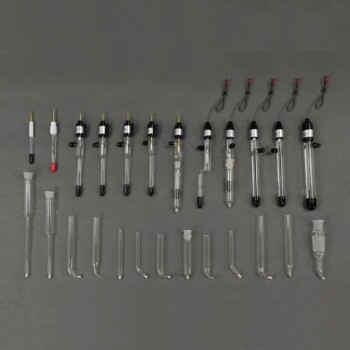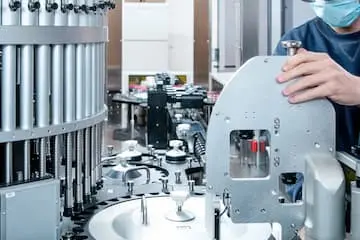We offer a convenient one-stop procurement service for electrochemical instruments and consumables. All you need to do is provide us with a list of the consumables you require, and we'll take care of the rest.
Our products are resistant to acids and alkalis, and made from high-quality materials that are both safe and durable. You can trust our products to meet your needs and provide reliable performance.
Toggle Categories
Get Instant Support
Choose your preferred way to connect with our team
-
Get Free Quote Fill out form for detailed pricing
-
Send Email Detailed inquiry support
-
WhatsApp Quick mobile chat
Response Time
Within 8 hours on working days, 24 hours on holidays
Electrochemical Consumables

Reference Electrode Calomel Silver Chloride Mercury Sulfate for Laboratory Use
Item Number : ELERA
$19.90
An electrolytic cell is an electrochemical cell that requires an external source of electrical energy to drive a chemical reaction that would not occur spontaneously. The cell consists of two electrodes, an anode (positive) and a cathode (negative), that are immersed in an electrolyte solution. By applying a voltage between the two electrodes, a chemical reaction is forced to occur.
This is different from a galvanic cell, which generates electrical energy and is the basis of a battery. In a galvanic cell, the overall reaction is spontaneous, meaning the Gibbs free energy remains negative. In contrast, the overall reaction in an electrolytic cell is the reverse of the spontaneous reaction, resulting in a positive Gibbs free energy.
Electrolytic cells are commonly used in various industrial and laboratory applications, such as electroplating, electrolysis, and the production of certain chemicals. They play a crucial role in many fields, including metallurgy, medicine, and energy storage. By controlling the applied voltage and the properties of the electrolyte solution, it is possible to tailor the reactions to produce desired products with high efficiency and precision.
Applications
Electrolytic cells use electrolysis to decompose chemical compounds, such as water and bauxite, into their constituent elements through the application of a direct electric current. Electroplating of metals like copper, silver, nickel, and chromium also uses electrolytic cells.
Electrolytic cells play a critical role in the commercial production of high-purity non-ferrous metals like aluminum, copper, zinc, and lead through the electrorefining and electrowinning processes.
KinTek Electrochemical Consumables
Our electrochemical consumables are a top choice for researchers and professionals alike. With a long production history, a wide range of products, and the ability to customize, our products is the perfect solution for all your electrochemical needs.
FAQ
What Are The Main Types Of Glass Substrates?
What Is Soda-lime Glass Used For?
What Is An Electrode In Electrochemistry?
What Is The Function Of Auxiliary Electrode?
What Are The Materials Used In Electrochemical Cell?
What Is Reference Electrode With An Example?
What Are The Advantages Of Using Sapphire Substrates?
What Are The 3 Electrodes In Electrochemistry?
What Is The Difference Between Auxiliary And Reference Electrode?
What Are The Examples Of Electrochemical Material?
What Is The Role Of Reference Electrode?
Why Is Boroaluminosilicate Glass Suitable For Laboratory Glassware And Cooking Utensils?
What Are The Different Types Of Electrochemical Electrodes?
What Materials Are Commonly Used For Auxiliary Electrodes?
What Is Reference Electrode Used For?
What Are The Applications Of Optical Quartz Glass Sheets?
What Materials Are Commonly Used For Electrochemical Electrodes?
How Do Auxiliary Electrodes Affect The Performance Of An Electrochemical Cell?
What Is A Reference Electrode Vs Counter Electrode?
What Is The Difference Between Standard And Reference Electrode?
What Makes K9 Glass Special?
What Factors Should Be Considered When Selecting An Electrochemical Electrode?
Why Are Auxiliary Electrodes Necessary In Electrochemical Systems?
What Is A CaF2 Window Used For?
How Can Electrochemical Electrodes Be Used In Various Applications?
Are There Any Limitations Or Considerations When Using Auxiliary Electrodes?
What Are The Properties Of Magnesium Fluoride Crystal Substrates?
What Is Silicon Used For In The Near-infrared Range?
What Are Glass Vibration Beads Used For In Laboratories?
REQUEST A QUOTE
Our professional team will reply to you within one business day. Please feel free to contact us!
Related Articles

The Architecture of Certainty: Mastering Control in Multifunctional Electrolytic Cells
Precision in electrochemistry isn't about guesswork; it's about hardware architecture. Learn how the three-electrode system isolates variables for true control.

The Architecture of Precision: Mastering the Five-Port Water Bath Electrolytic Cell
Mastering the electrolytic cell is not just about chemistry; it is about discipline. Learn the systematic approach to preparation, operation, and maintenance.

The Geometry of Truth: Why the Maintenance of Your Optical Electrolytic Cell Defines Your Data
Great data isn't just about the experiment; it's about the vessel. Learn the rigorous maintenance protocols for side-window optical electrolytic cells.

The Quiet Discipline: Mastering the Post-Use Protocol for Five-Port Electrolytic Cells
Learn the methodical post-use care for five-port water bath electrolytic cells. Prevent corrosion, ensure safety, and protect your experimental data.

The Silent Interface: Mastery Over Electrode Decay
Electrode failure is rarely sudden; it is the compound interest of neglect. Learn the disciplined maintenance protocols that preserve accuracy and longevity.

The Architecture of Control: Mastering the Super-Sealed Electrolytic Cell
Precision in electrochemistry isn't just about theory; it's about mechanical discipline. Learn the critical protocols for super-sealed electrolytic cells.

The Architecture of Control: Why Thermal Stability Defines Electrochemical Precision
Master electrochemical accuracy by understanding the interplay between three-electrode systems and thermal regulation. Eliminate variables to ensure reproducibility.

The Thermodynamics of Precision: Mastering the Double-Layer Electrolytic Cell
Precision isn't accidental. Discover the methodical operation of double-layer electrolytic cells, where thermal stability and rigid setup define success.

The Architecture of Purity: Why Electrochemical Experiments Fail
Contamination in electrolytic cells is rarely just "dirt"—it is data corruption. Discover the systemic approach to preserving experimental integrity.

The Silent Variable: Engineering Reliability in Electrolytic Cells
Data accuracy depends on equipment integrity. Learn the engineering protocols for maintaining electrolytic cells to prevent systemic error.

The Quiet Architecture of Clarity: Preserving Side-Window Optical Cells
Learn the precise protocols for storing optical electrolytic cells. Prevent thermal degradation, chemical etching, and data drift with expert maintenance strategies.

The Silent Partner: Why Material Choice in Electrochemistry is a Matter of Trust
Discover why high borosilicate glass and PTFE are the non-negotiable standards for electrolytic cells. A deep dive into material science for precise data.

The Architecture of Control: Why Thermal Stability Defines Electrolysis Success
Discover how double-layer water-bath electrolytic cells eliminate thermal variables, ensuring accuracy and reproducibility in electrochemical research.

The Art of the Non-Spontaneous: Precision in Electrolytic Circuits
Mastering the electrolytic cell setup requires more than connecting wires. It demands a systematic approach to polarity, purity, and power control.

Preparation Technologies and Applications of High-Purity Metals
An in-depth look at the definition, preparation technologies, and applications of high-purity metals.

Guide to Reference Electrodes in Electrochemical Measurements
Detailed guide on reference electrodes, their use, maintenance, checking methods, regeneration, storage, and applications.

Glymercury Electrode: Composition, Characteristics, and Applications
An in-depth look at the glymercury electrode, its composition, characteristics, and applications in analytical chemistry.

Use and Care of Reference Electrodes
Detailed guide on the use, calibration, and maintenance of reference electrodes in electrochemical studies.

Design and Application of Reference Electrodes in Lithium Batteries
An in-depth analysis of the design, features, and applications of reference electrodes in lithium batteries.

Understanding Electrodes in Electrochemical Systems: Working, Counter, and Reference Electrodes
An overview of the roles and characteristics of working, counter, and reference electrodes in electrochemical systems.






